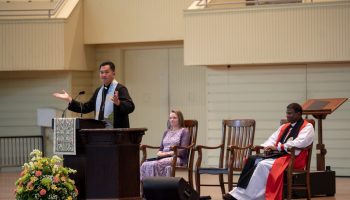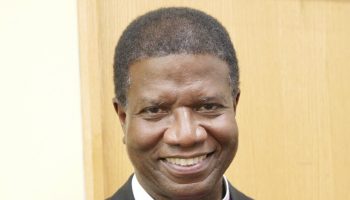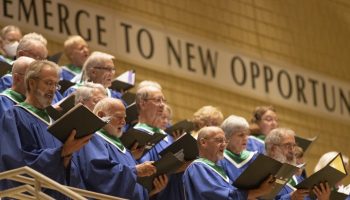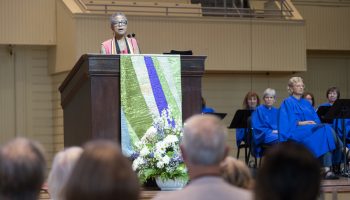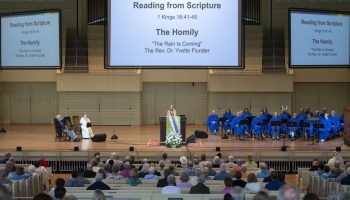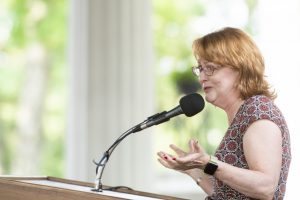
“There are many dangerous places in the world today, and one of the most dangerous and least peaceful is the family dinner table during the holidays,” said the Rev. Susan Sparks at the 9:15 a.m. Tuesday Ecumenical Service. Her sermon title was “The Politics of Sweet Potato Casserole,” and the Scripture text was Isaiah 9:6, 40:1-5. The Advent theme was peace.
There is always a glitch at these dinners.
“Your brother brings his new girlfriend, Aquarius, who only eats wheat germ with a bit of alfalfa,” Sparks said. “Cousin Ned has a limited-edition, signed photograph of Karl Rove and is seated next to your aunt wearing a Rachel Maddow T-shirt. And Eddie plays the same song over and over, ‘Baby Shark,’ and he is 37 years old.”
The most dangerous time is when the family actually talks about the food itself.
“The battlelines are drawn, arms folded, eyes narrowed,” she said. “Is it marshmallows or brown sugar and pecans on the sweet potato casserole? I am a brown sugar and pecans person, and only lesser beings like that white, sticky stuff.”
In a show of hands, most of the congregation agreed.
“The actual conflict is pretty lame,” Sparks said. “Both will put you in a sugary, diabetic coma and a tent dress really fast. Both make a great casserole, so surely there is a happy medium in all the yumminess.”
This conflict sounds sadly like the world, especially America, which is so polarized.
“It is like we ripped the San Andreas Fault out of California and embedded it in our hearts and folded our arms and narrowed our eyes,” Sparks said.
She described a greeting card with two women, in 1950s dresses, holding cigarettes. One woman says to the other, “All I know is one of us is right and the other is you.”
“There is a right and a wrong way to do things,” Sparks said. “Like toilet paper — it comes over the top of the roll. But I can see the dissension; we can’t even agree on that. There was a patent filed on Sept. 15, 1891, that shows a graph with the paper coming over the roll as opposed to coming under it. I would love for things to be that easy, but most issues are not so clearly decided. There must be more than one way to see an issue.”
She suggested that the congregation look to St. Francis. Instead of a direct throw-down of opinions, people look “not so much to be understood, as to understand.” This is interest-based negotiation, as suggested by Roger Fisher and William Ury in Getting to Yes: Negotiating Agreement Without Giving In. The negotiator helps the parties find out why the issue is so important and helps them find common ground and shared values from which solutions can flow.
“Isaiah shared images of common ground during the Babylonian exile,” Sparks said. “God, Isaiah wrote, would return triumphantly to restore and deliver God’s people.”
The highway would be made straight, every valley raised, the mountains brought low, the rough places leveled into a plan and all the people would see the glory of God together, Isaiah said. For this restoration to come, “the people need to see God in each other,” Sparks told the congregation.
“We need to straighten out the crooked paths of our hearts and prepare to meet God in our neighbor, in the face of the other,” she said.
Sparks described a TED Talk in which journalists brought together a group of people from Alabama, and a group from California. Instead of asking what each group thought of the other, they asked “What do you think the people in the other group think of you?” The Alabamans said they believed Californians considered them religious Bible-thumpers, backward, racist, sexist, ignorant, barefoot and pregnant. The Californians said they believed the Alabamans considered them crazy, liberal, not patriotic, snobby, elitist, godless and out of touch.
“Both sides saw how simplistic and mean-spirited these characterizations were,” Sparks said. “They found some common ground, no matter how small a sliver, for real dialogue. There was an equalization of voices.”
The journalists have expanded this method to other groups in the country. Returning to the sweet potato casserole controversy, she said, “there is some common ground — a delight in sweets. How do we get there? A new recipe. Maybe brown sugar, pecans and marshmallow mixed together. Maybe half marshmallow on one side, and brown sugar and pecans on the other. Or maybe use Captain Crunch.”
There is common ground for the politics in this country.
“We all want a better world for our children — fair and equal economic opportunities, protection from terrorism, to live our lives in peace and harmony,” Sparks said. “We need a new recipe for our own nation, a fresh approach, a commonality that will combine all our recipes into a dish that will feed us all. Miraculous things can happen.”
Sparks visited the Civil Rights Trail in Alabama, and went to the 16th Street Baptist Church that was bombed on Sept. 15, 1963, by the Klu Klux Klan. Four young girls, Addie Mae Collins, Cynthia Wesley, Denise McNair and Carole Robertson, were killed. As Sparks stared at the stained glass window in the back wall, a member of the congregation told her that the black, crucified Jesus has a clenched right hand to push away hatred and an outstretched left hand for forgiveness. The words on the window say “Do it for me,” a reference to Jesus speaking in Matthew that when you feed the hungry, clothe the naked and visit the prisoner, you do it for Jesus, Sparks told the congregation. The news of the bombing caused international outrage. John Petts, a Welsh artist, started a campaign to fund a stained glass window.
“He limited the donation to half a crown, about 15 cents today,” Sparks said. “We have the same opportunity today to transform the fighting to healing and to find common ground. Barack Obama said our individual salvation depends on our collective salvation. We have to hitch ourselves to something larger than ourselves to find our role in the next chapter of this nation.”
This country is too rich to be brought down by petty things. “We are all created equal, and this year we need to acknowledge our commonalities as a nation and as a global family,” Sparks said. “We have a Wonderful Counselor, we are the children of a Mighty God and the Prince of Peace. For God’s sake, let’s act like it. And the people of God said amen.”
The Rev. Natalie Hanson presided. Kylee Miller, a high school senior who will attend Corning Community College and is in her second season working at the Hall of Missions with her grandparents, Bill and Maggie Brockman, read the Scriptures. The Motet Choir sang “O Holy Child,” by Michael Cox, as the introit. The Choir sang “A Shoot Shall Come Forth,” by Richard Horn, with text from the Book of Isaiah as the anthem. Jared Jacobsen, organist and coordinator of worship and sacred music, directed the choir. The Harold F. Reed Sr. Memorial Chaplaincy and the J. Everett Hall Chaplaincy provide support for this week’s services.

